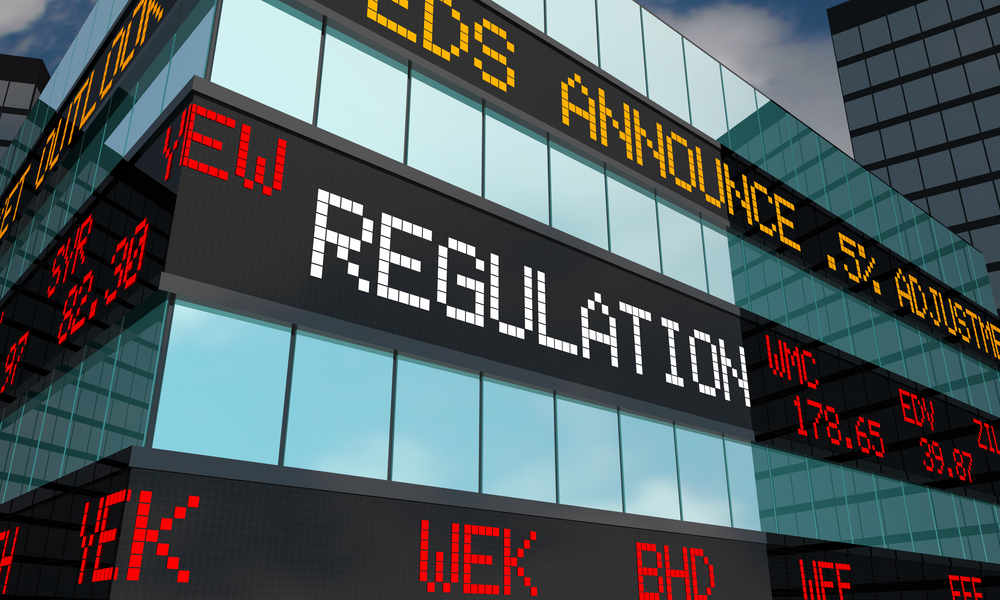Here’s a thought experiment that recently occurred to me. Imagine that many decades ago, financial regulators passed a law about investing in the stock market. According to this law, each person may buy stock in one company, and only one company. If you wanted to invest in the stock market, you must put all of your stock holding in Krispy Kreme Donuts, or CitiBank, or Tesla, etc.
There are, shall we say, some rather obvious downsides to a program like this. For one, it would serve to massively discourage investment in new, innovative, but potentially risky companies. Being an Apple stockholder is a pretty safe investment at the moment, but when Apple was a fledgling startup, investing in Apple would have been highly risky. Without a law like this, some people would still have an incentive to invest some portion of their holding in risky startups like the Apple of old, but if this law had been in effect, people would be far more likely to put all their holdings in a relatively safe company like Apple is today. Except, of course, there very likely would be no Apple today, had such a law existed at the time.
Another obvious downside is that when a company goes bankrupt, everyone who held stock in that company would see their stock investments completely wiped out, because their holdings in that company would necessarily represent 100% of their stock holdings. This would make downturns in the stock market far more devastating than they otherwise would be.

How should people respond to such a regulation? If your answer is “stop making it illegal to have a diversified stock portfolio,” then I congratulate you on your good sense. But suppose regulators lacked this good sense? Suppose instead they were to say that the financial devastation people experience in the stock market just shows the dangers of allowing unregulated investing – it shows that the government isn’t regulating enough. So there is a new wave of regulations passed tightly controlling how people can invest in the stock market, as well as establishing a program that ensures whenever anyone loses money in the stock market, they will get funds at taxpayer expense to make up for their losses. Now, nobody has a particular need to be cautious about which company they are investing in – if that company goes under and the value of your stock is wiped out, you’ll just get bailed out by the taxpayer.
It may strain credulity to imagine such a system would ever be set up. But with a few tweaks, the above story is something that has already happened. For a very long time, the United States had financial regulations which forbade branch banking, which is to say, banks that could operate at a large scale across multiple areas. These unit-banking laws created a situation where small local banks made up a massively disproportionate amount of the banking system, relative to what was produced in countries with relatively unregulated banking, like Canada. Like the hypothetical stock market law described above, a small unit bank is legally required to put all their financial eggs in one basket. Small, undiversified banks would have all their financial assets tied to local economic conditions – so if there was a local economic downturn, the local banks were all but guaranteed to go down as well, worsening the situation.
If your reaction is to think “Well, stop making it illegal for banks to branch out and diversify” then I congratulate you on your good sense, but sadly financial regulators lacked such good sense. Instead, they claimed that this fragility in the banking system showed the dangers of “unregulated banking” and only showed that the government isn’t regulating banking enough – despite the far superior contemporary and historical performance of unregulated banking systems. So, the regulators passed laws putting even tighter controls on banking, and establishing the FDIC, ensuring that depositors would get their money back whenever their banks failed.
Scott Alexander once suggested people have a tendency to just assume the regulation that exists is the right and appropriate level, saying “There’s an old saying: ‘Everyone driving faster than you is a maniac; anyone driving slower than you is a moron’. In the same way, no matter what the current level of regulation is, removing any regulation will feel like inviting catastrophe, and adding any regulation will feel like choking on red tape.”
I suspect that had such a hypothetical law been passed early in the 20th century to ensure that anyone who loses money in the stock market would get bailed out by the taxpayer, and if a couple of generations of people were born and raised in that system, it would be taken for granted today that of course the government needs to financially guarantee people against stock market losses. In such a world, where the prospect of losing money on the stock market has been removed, and people have no incentive to ensure they are investing carefully, we would expect to see far more unwise investments, creating more and more situations where people “need” to be bailed out, which would only serve to convince people more and more about the necessity of such bailouts, etc. It simply wouldn’t occur to people that the reason such bailouts are “necessary” is because of the very regulations they think protect them – and suggesting that we move from that world to one more like our own would seem like utter madness.
I’m just glad we don’t live in a world like that…


READER COMMENTS
David Seltzer
Jul 26 2023 at 3:52pm
Kevin: The pernicious effect is the unseen. In 2010 a colleague and I with combined 80 years of experience in the capital markets had pledges from investors to start a hedge fund. The Dodd-Frank act was enacted in July of 2010. We paid a securities law firm several thousand dollars to read the new act, give us an opinion as to to its impact on hedge funds as well as foundation of opinion. Their answer; the act was so full of conflicting regulations and rulings, even if we complied with one reg, we could be cited for complying with it. My colleague and I refused to move forward in that uncertain, arbitrary compliance environment.
In the end, I felt I was doing my due diligence as a risk manager.
Comments are closed.